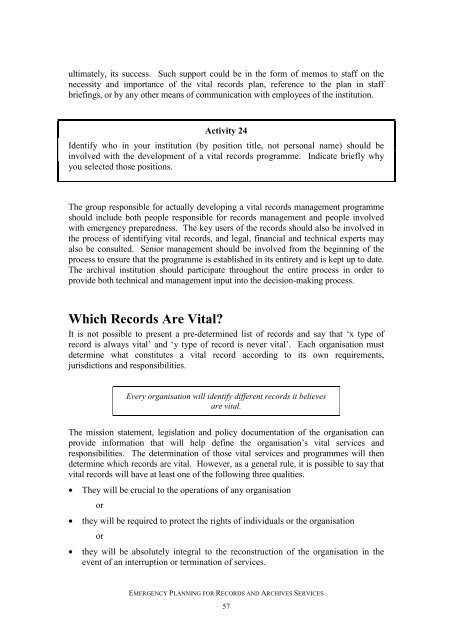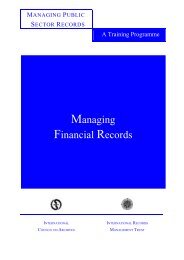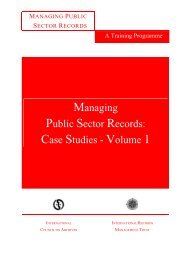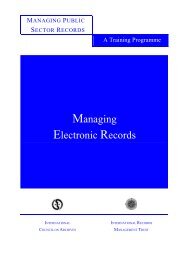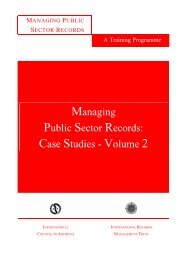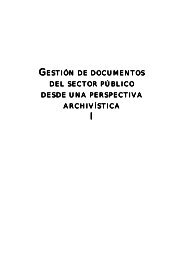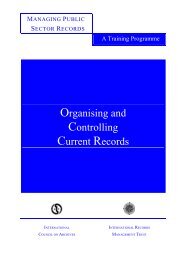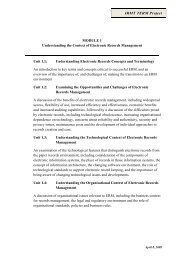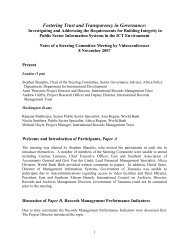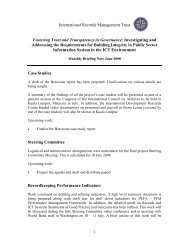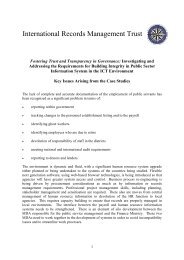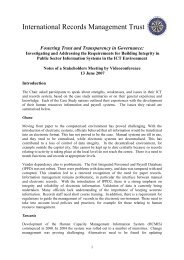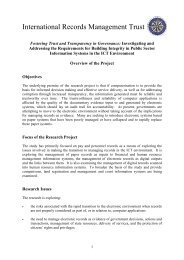disaster planning and control - International Records Management ...
disaster planning and control - International Records Management ...
disaster planning and control - International Records Management ...
You also want an ePaper? Increase the reach of your titles
YUMPU automatically turns print PDFs into web optimized ePapers that Google loves.
ultimately, its success. Such support could be in the form of memos to staff on the<br />
necessity <strong>and</strong> importance of the vital records plan, reference to the plan in staff<br />
briefings, or by any other means of communication with employees of the institution.<br />
Activity 24<br />
Identify who in your institution (by position title, not personal name) should be<br />
involved with the development of a vital records programme. Indicate briefly why<br />
you selected those positions.<br />
The group responsible for actually developing a vital records management programme<br />
should include both people responsible for records management <strong>and</strong> people involved<br />
with emergency preparedness. The key users of the records should also be involved in<br />
the process of identifying vital records, <strong>and</strong> legal, financial <strong>and</strong> technical experts may<br />
also be consulted. Senior management should be involved from the beginning of the<br />
process to ensure that the programme is established in its entirety <strong>and</strong> is kept up to date.<br />
The archival institution should participate throughout the entire process in order to<br />
provide both technical <strong>and</strong> management input into the decision-making process.<br />
Which <strong>Records</strong> Are Vital?<br />
It is not possible to present a pre-determined list of records <strong>and</strong> say that ‘x type of<br />
record is always vital’ <strong>and</strong> ‘y type of record is never vital’. Each organisation must<br />
determine what constitutes a vital record according to its own requirements,<br />
jurisdictions <strong>and</strong> responsibilities.<br />
Every organisation will identify different records it believes<br />
are vital.<br />
The mission statement, legislation <strong>and</strong> policy documentation of the organisation can<br />
provide information that will help define the organisation’s vital services <strong>and</strong><br />
responsibilities. The determination of those vital services <strong>and</strong> programmes will then<br />
determine which records are vital. However, as a general rule, it is possible to say that<br />
vital records will have at least one of the following three qualities.<br />
• They will be crucial to the operations of any organisation<br />
or<br />
• they will be required to protect the rights of individuals or the organisation<br />
or<br />
• they will be absolutely integral to the reconstruction of the organisation in the<br />
event of an interruption or termination of services.<br />
EMERGENCY PLANNING FOR RECORDS AND ARCHIVES SERVICES<br />
57


